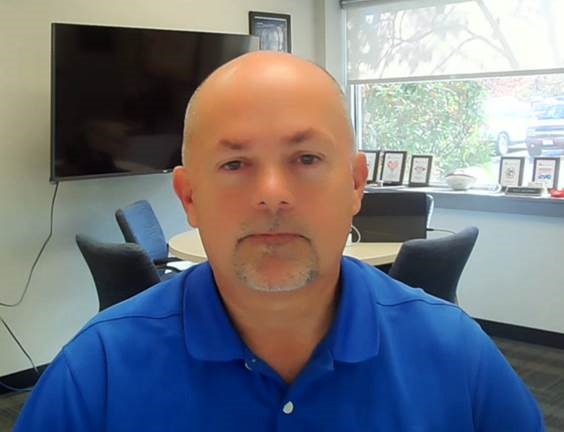As part of the 2024 Heart Healthy Hunting campaign, Paul Murphy, Vice President/General Manager of InMotion US (Blacksburg, VA), shares his story of surviving a heart attack while hunting with his brother.
In November 2016, as they always did together, Paul and his brother Jim went out hunting the day after Thanksgiving. While on the hunt, they split up and Paul, much to his surprise, landed a 10-point buck. Jim caught up with him and together they were able to drag the deer out of the forest and back to Paul’s truck. It was no easy feat, but together they made it work.

They took the deer to a relative’s house to get it field dressed and, while there, Paul noticed that he wasn’t feeling well. “I told my brother that I just didn’t feel right,” Murphy said. “I didn’t have any chest pains, but I felt very sick.” Paul sat down and, eventually, the feeling went away, and he felt better. Later that evening, Paul was driving himself home and started feeling a tightness in his chest. “I’m thinking that this may be a little concerning,” he said. “My company had Teladoc, so I pulled over and called the doctor.”
The doctor explained that Paul could be having a heart issue but could also have pulled a muscle while dragging the deer, which is not uncommon considering how heavy a buck can get. The doctor recommended he take some ibuprofen, which helped relieve the pain. Paul drove home and felt better as he went to bed. “I felt tired, but had no more chest tightness or anything to tell me it was a heart-related issue.”
The weekend passed and, while Paul was feeling a bit off, he didn’t have any chest pains. He went back to work on Monday and felt like he was running a fever. Tuesday, he felt a bit worse. But on Wednesday, he woke up nauseous and was vomiting. “I called my wife and told her my symptoms and she told me I needed to see a doctor” he said. “I’m thinking I just have a virus, not making any association that this could be related to what I felt like the previous Friday on the hunt.” Paul called his doctor at Carilion Clinic and went in to see him. They did an EKG and his doctor told him that it was abnormal. They immediately admitted him to the hospital.
Paul was surprised by the whole thing. “The part of this that is difficult for me to share is that my wife lost her first husband in 2008 to sudden cardiac arrest. She lost a great guy to a cardiac event and now I have to call her and tell her I’m in an ambulance due to an abnormal EKG.”
“They took me to LewisGale and did further tests and then they told me that I’d had a heart attack,” Paul said. “My troponin enzymes were very high, indicating a non-STEMI event.”
That Friday, they decided to check for blockages and found that Paul had a 100% blockage in his right coronary artery.
“After I woke up from surgery, they told me that they had put in three stents due to a 100% blockage,” Paul said. “My doctor told me that I was one of the healthiest heart attack victims he’d ever seen and figured it must be genetic. I realized that many of my family members have had heart attacks, so my genetics could very well have been a factor.”
“The work I exerted out on the hunt was basically more than my heart could keep up with, which is what triggers a heart attack,” Paul said.
Paul recollected a trip he took a few months prior to his incident when he went to northern Chile on a trip. Due to the difference in elevation, a traveler’s blood pressure must be checked before going on any hikes in the region. “When I got to the base camp, they took my blood pressure and they told me that they couldn’t allow me to go due to it being so high,” he said. “I was very surprised.” They waited an hour to take it again, but it was still too high for him to go on the hike. “The person who checked me said I really should go see my doctor but, when I returned home, I didn’t go see him. Looking back now, that was the only real indication I had that I was perhaps developing heart issues.”
Since then, Paul has done cardiac rehab and keeps regular appointments with his cardiologist.
“I feel fine now, with no issues that I’m aware of,” he added.
“The most important thing I want people to take away from my story is that when you’re out hunting or doing anything that causes more exertion than you normally use, pay attention to your body. If this is not what your normal activity level is, be cautious and don’t let yourself get caught up in the heat of the moment and push your body over its limit.”